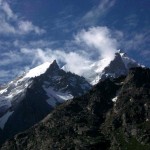God on the mountain tops – B’har
 A sidra that is called B’har – “On the Mountain” – will inevitably be interpreted symbolically as well as literally.
A sidra that is called B’har – “On the Mountain” – will inevitably be interpreted symbolically as well as literally.
Mountains play an important part in Biblical and Jewish history. The binding of Isaac took place on a mountain. The giving of the Torah was on a mountain. Elijah confronted the prophets of Baal on a mountain.
Mountains also evoke spirituality. The Psalmist says, “I lift up my eyes to the mountains: from whence comes my help?” It is not that the mountain itself is a source of help, but, as Samson Raphael Hirsch puts it, “There is One Who is higher still and surer” (Commentary on Psalm 121:1-2).
The Talmud tells us that Abraham found God on a mountain, Isaac found Him in a field and Jacob found Him in a house (Pes. 84a).
The references to Isaac and Jacob require a commentary to themselves, but the assertion about Abraham is a remarkable contribution to our understanding of spirituality and holiness. For the mountains are in a way the meeting place of God and man.
The 19th chapter of Exodus, the prologue to the giving of the Torah, speaks of God coming down onto Mount Sinai and Moses ascending. The mountain was the setting for their encounter, as Mount Moriah was the setting for the meeting of God and Abraham.
To understand the spiritual significance of the mountains one must know that for Judaism the way to God is not through theological assertions or philosophical propositions. One cannot truly encounter the Divine by merely mouthing a creed or restating the cosmological, teleological, ontological or any other supposed philosophical “proof”.
The way of Judaism is not to work through what Leo Baeck called “finished statements”; the only finished statement in Judaism is “Hear, O Israel, HaShem is our God, HaShem is one”, and “one” is not simply a number but an acknowledgement that God is unique and cannot be delimited or defined.
So where do we find God?
In the certainty that we are in His presence. And that is where the mountains help. For there is a majesty and mystique about mountains. It cannot and need not be put into words, but it is there nonetheless.
Rudolf Otto, author of “The Idea of the Holy”, sensed a holiness in a simple North African synagogue which he described as “numinous”. The numinous, however, cannot easily be put into words, just as one cannot easily articulate the appeal of a work of art or music.
Berthold Auerbach said of music that it was “a universal language, and need not be translated. With it soul speaks to soul” (“Auf der Hohe,” 1865). Religion too is “a universal language, and need not be translated”.



